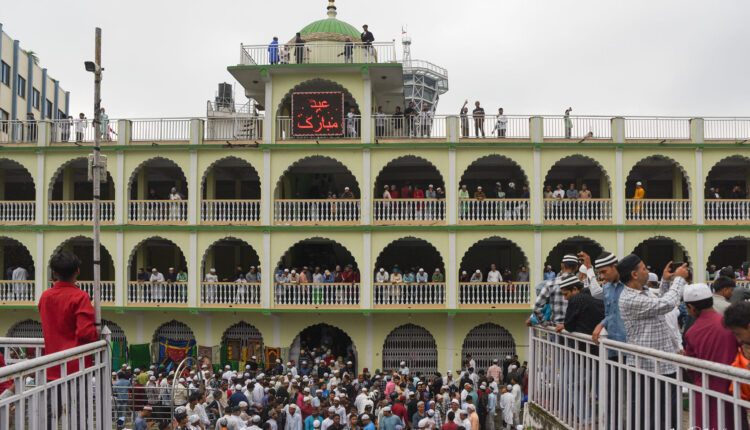Kathmandu. Bakr Eid (Idul Joha), the second great festival of Muslims, is being celebrated in mosques all over the country today. There is a religious tradition of celebrating Bakr Eid on the 70th day of Ramadan. Muslims take a bath early in the morning and go to the nearest mosque or Idgah to pray in congregation. After praying, it is customary to exchange greetings with each other.
On this occasion, Muslims gather in mosques and Idgahs across the country including Nepali Jame Masjid, Kashmiri Masjid located on Durbar Marg. According to the Hijri calendar, 1439 years ago, this festival was started to commemorate that Ibrahim was ready to sacrifice his son Ishmael, peace be upon him, at the command of Allah.
Muslim religious guru (Maulana) Rahmat Ali says that Muhammad Salalah was born in Mecca in the year 571 and continued in the lineage of Ibrahim, which became the basis of the historical Bakr Eid festival. Who made a significant contribution to pass down this festival and religion from generation to generation and composed a scripture called Hadith.
“The book which is now being studied and taught in Muslim religious schools (madrasahs), Salalah, who was born in Mecca, moved to Medina after the age of 53. In memory of this, even now, a large fair is held in these two pilgrimage sites in Saudi Arabia”, he said.
On the occasion of this festival, it is considered auspicious to go to Mecca and Medina. The Ministry of Home Affairs arranges flight tickets to go to Makkah and Madinah. For this purpose, the secretariat of the Hajj committee has been established under the Ministry of Home Affairs. Even the pilgrims who cannot go to Makkah and Madinah celebrate Bakr Eid at home.
The main purpose of this festival is Hajj. In order to please Allah during this festival, Muslims offer Qurbani (sacrifice) to animals that are considered legitimate by religion.
According to religious belief, Allah’s new messenger, Ibrahim Ali Salam, at the age of 90, received an order to sacrifice his son Ismail, the child he had from his wife Hajar.
It is religiously believed that if Allah is pleased with it, it is not the sacrifice of Ishmael, but the sacrifice of the dumbas who have been raised in heaven (Jannat). For this reason, Muslims say that they have maintained the tradition of sacrifice.
The childless Ibrahim asked Allah to bless him with children. Ibrahim’s commitment was that if Allah gives me the happiness of children, I will sacrifice. Accordingly, Muslims believe that Allah said that he should sacrifice himself in his dream as a test.
He sacrificed many animals but Allah was not pleased. In the end, he wanted to please Allah by sacrificing his most beloved son.
At this moment, after his test was proved to be successful, instead of a human being, the Qurban (sacrifice) of Dumba, who had been brought up to heaven, was performed.
The meat of Qurbani is divided into three parts. It is a Muslim religious belief that one portion should be given to the poor and needy family, another portion should be given to friends and the third portion should be eaten by oneself. Accordingly, the first day of Bakr Eid is being celebrated today.
Muslims will celebrate this festival for three days till Wednesday. Mansoor Hussain, secretary of Nepali Jame Masjid informed that there is a tradition for Muslims to perform sacrifices on all three days of this festival. On this occasion, the government has declared a public holiday today.
Trending Now
- Five ambassadors take oath
- 72 billion and 93 crore rupees assistance in improvement of electricity transmission and distribution system
- Significant increase in foreign aid commitments, two billion received in five months
- सम्पत्ति शुद्धीकरण निवारणमा नेपालको अवस्था सुधार्न उच्चस्तरीय बैठक
- कवि, गीतकार तथा गजलकार प्रेमप्रसाद भट्टराईको एकल गजल वाचन सम्पन्न
- अनिता कोइरालाको उपन्यास ‘उज्यालो औँसी’माथि अन्तरक्रिया सम्पन्न
- शिव प्रधानको ‘प्रेमाश्रु’ उपन्यास लोकार्पण
- नेपाल पत्रकार महासंघको नवनिर्वाचित अध्यक्ष निर्मला शर्मा सम्मानित
- घुम्न जाऔं बर्दिया अभियान सुरु
- निर्वाचन प्रणालीलाई परिमार्जन गर्नुपर्छ: गगन थापा


Comments are closed.